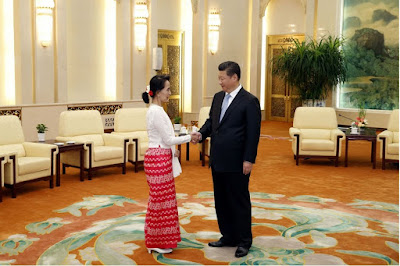[Though she has traveled
around the world since her release from house arrest in 2010, this is Ms. Aung
San Suu Kyi’s first visit to neighboring China, which had a close relationship
with the military junta that imprisoned her for the better part of two decades.
Despite that history — and the fact that a fellow Nobel Peace laureate, the
writer Liu
Xiaobo, is serving an 11-year prison sentence in China for
advocating the same democratic principles that Ms. Aung San Suu Kyi has
championed — Mr. Nyan Win said she was not expected to chide the Communist
Party on its human rights record.]
HONG KONG — Daw
Aung San Suu Kyi, the Nobel Peace laureate who
leads Myanmar’s opposition, met with President Xi Jinping on
Thursday, the second day of her visit to China — a trip that appears likely to
underscore her transformation from a global icon of democracy to a politician
with ambitions to form her country’s next government.
Mr. Xi and Ms. Aung San
Suu Kyi met at the Great Hall of
the People, according to Xinhua, the state-run Chinese news agency,
which provided few details of the meeting. Ms. Aung San Suu Kyi, who was
invited to Beijing by the ruling Communist Party, is also expected to meet with
Premier Li Keqiang during her five-day visit, U Nyan Win, a spokesman for her
party, the National League for Democracy, said before her arrival in Beijing on
Wednesday.
Mr. Xi, the leader of the
Communist Party, said the visit would help promote ties between the two
countries and the two parties, Xinhua said on Twitter.
Though she has traveled
around the world since her release from house arrest in 2010, this is Ms. Aung
San Suu Kyi’s first visit to neighboring China, which had a close relationship
with the military junta that imprisoned her for the better part of two decades.
Despite that history — and the fact that a fellow Nobel Peace laureate, the
writer Liu
Xiaobo, is serving an 11-year prison sentence in China for
advocating the same democratic principles that Ms. Aung San Suu Kyi has
championed — Mr. Nyan Win said she was not expected to chide the Communist
Party on its human rights record.
Ms. Aung San Suu Kyi’s
party may move from opposition to governance after elections likely to take
place late this year, and regardless of who is in power, managing ties with
China — the country’s biggest
trading partner — will be essential to keeping Myanmar’s
economy growing.
“For her there would be
very little value in getting offside with the Chinese government, and there
would be much to be gained by increasing the level of confidence that the
Chinese authorities would feel about her stepping into a senior position in
Myanmar in the years ahead,” Nicholas Farrelly, the director of the Myanmar
Research Center at Australian National University, said before the visit began.
But such an approach
would probably cause further damage to Ms. Aung San Suu Kyi’s reputation as a
champion of human rights, which has already been hurt by her refusal to condemn
Myanmar’s persecution of its Muslim Rohingya minority. Tens of thousands of
Rohingya have fled Myanmar in recent months, spawning a regional refugee crisis.
“Suu Kyi’s silence on
human rights has damaged her credibility as a leader,” Sophie Richardson, China
director for the New York-based group Human Rights Watch, wrote before
the trip began. “If she is silent on rights in China, those questions will only
deepen.”
Ms. Richardson said Ms.
Aung San Suu Kyi should push for Mr. Liu’s immediate release from prison and
call for Chinese companies doing business in Myanmar, formerly called Burma, to
end what she called their “abusive and environmentally damaging practices.” The
latter position would probably be popular in Myanmar, where many people,
including opposition supporters, are wary of China’s huge economic footprint.
Chinese companies in
Myanmar mine copper and
jade, cut down hardwood forests and build big infrastructure projects,
including contentious gas and oil pipelines stretching from the Bay of Bengal
to the Chinese province of Yunnan.
In an English-language editorial published
on Wednesday, Xinhua said Ms. Aung San Suu Kyi’s visit was a sign that the
Communist Party not only communicates with parties with “the same ideology, but
also those with a different political vision.” It said that “China welcomes
anyone with friendly intentions and it bears no grudge for past
unpleasantness.”
Relations between Myanmar
and China cooled as the Myanmar government forged better ties with
the United States starting in 2011. Still, as of 2013, about a third of
Myanmar’s overseas trade was with China, with which it shares a 1,370-mile border.
Ties were further
strained in March, when Chinese officials said a bomb from a Myanmar warplane
had exploded across
the border in Yunnan Province, killing five farmers tending a sugar cane field.
The Myanmar Army is fighting armed members of the ethnic Chinese Kokang
minority in the border region.
Mr. Nyan Win said that
the border issue would be on Ms. Aung San Suu Kyi’s agenda. “We need peace at
the border for both countries,” he said.
On Tuesday, a spokesman
for the Chinese Foreign Ministry, Hong Lei, told reporters in Beijing that the
visit would “promote the development of friendly and cooperative relations between
China and Myanmar.”
But the Xinhua editorial
on Wednesday sounded a warning about the border issue. “There is also a
reminder: China has no intention to interfere in Myanmar’s internal affairs,
but is determined to protect its citizens from being caught in war launched
from the other side of the border,” the editorial said.


